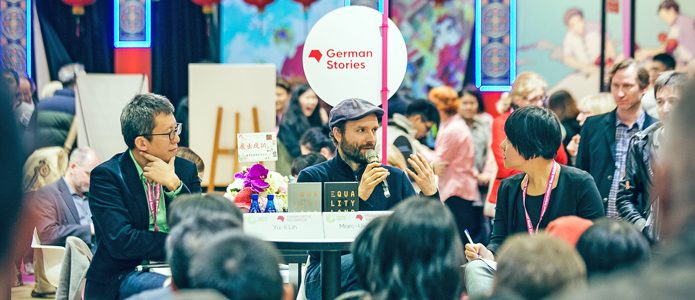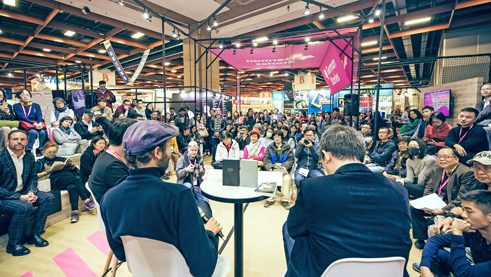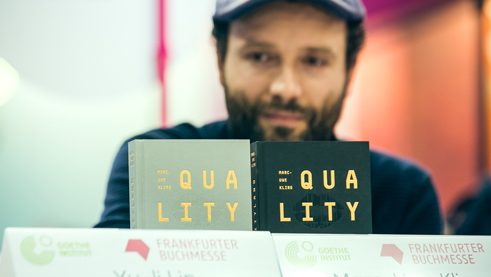“German Stories” at the 2019 Taipei International Book Exhibition
“Data must be protected so that we can be free”

Germany is presenting itself at the 2019 Taipei International Book Exhibition under the motto “German Stories.” At the invitation of the Frankfurt Book Fair, the Goethe-Institut Taipei and the German Institute Taipei, 13 German authors are presenting their works in tandem with Taiwanese authors. Bestselling author Marc-Uwe Kling spoke with journalist and author Yu Li Lin about his dystopian satire Qualityland.
By Jan Küveler
It’s safe to assume that not many people in Taipei listen to the radio station Rundfunk Berlin-Brandenburg. And there’s little to suggest that productions from Germany’s cabaret scene play any major role in the trade volume between Germany and Taiwan. And still, book fair visitors are flocking in droves to the German booth in Taipei Convention Center where the songwriter, cabaret artist and author Marc-Uwe Kling is talking about his latest novel and will read one of those little kangaroo stories that made him famous on German radio and cabaret stages.
 The writers’ duo attracts a large audience to the German booth
| Photo: Terry Lin
The writers’ duo attracts a large audience to the German booth
| Photo: Terry Lin
Determined by algorithms
It may be an effect at work that the likeable thirty-something writer with his close-cropped beard and blue paddy cap describes in his novel Qualityland: That we’re close to living in a world in which algorithms and consumer systems they control have long known who we are and what we need before we even realise it. Kling has designed a world according to this principle in which people are assigned a kind of usefulness score between 1 and 100 and are therefore allocated the corresponding products, whether frozen pizza or a life partner. Maybe there is such a system in Taiwan already and we just haven’t heard about it in Europe. At any rate, it’s a surprisingly large crowd although neither Qualityland nor the Kangaroo Trilogy has yet been translated into Chinese. The conversation titled “On Human Machines and Machine Humans” between Kling and Berlin-based translator Yu Li Lin is characterised by the same cheerful fatalism that also imbues the current novel. Kling reports about a hike he took on nearby Elephant Mountain. It offers a great view of the city on nice days. Unfortunately it was not a nice day. So he thought someone should develop an app called ClearSky that would make the clouds disappear at the push of a button, at least on your smartphone display. But then he realised that this solution would certainly be used immediately against the best interests of the people: The developer would demand payment and release the service for remote access and then no one would bother to climb Elephant Mountain. Everyone would sit lazily at home enjoying the ClearSky view. This is how a utopia congeals into a dystopia within seconds. The two editions of the dystopian satire Qualityland by Marc-Uwe Kling
| Photo: Terry Lin
The two editions of the dystopian satire Qualityland by Marc-Uwe Kling
| Photo: Terry Lin